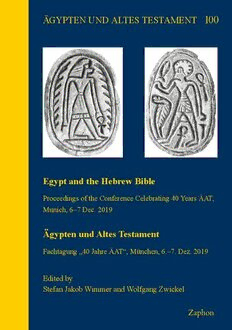
Egypt and the Hebrew Bible: Proceedings of the Conference Celebrating 40 Years Aat, Munich, 6-7 Dec. 2019/ Fachtagung 40 Jahre Aat, Munchen, 6-7. Dez. ... Testament, 100) PDF
307 Pages·11.869 MB·English, German
Most books are stored in the elastic cloud where traffic is expensive. For this reason, we have a limit on daily download.
Preview Egypt and the Hebrew Bible: Proceedings of the Conference Celebrating 40 Years Aat, Munich, 6-7 Dec. 2019/ Fachtagung 40 Jahre Aat, Munchen, 6-7. Dez. ... Testament, 100)
Description:
To celebrate the first 40 years of the series "Aegypten und Altes Testament" with its 100th volume a conference on the topic of the series - Egypt and the Hebrew Bible - was hosted in December 2019 in Munich. In this volume the papers are attributed to three major fields: language, iconography, and history. In the first section of this volume linguistic approaches are presented. Francis Breyer presents some of the results of his research about Egyptian names and words in the Old Testament. His scientific approach is closely connected with Gorg's main interests in both fields. Pieter Gert van der Veen presents another main interest of Gorg's research. Gorg was - since his dissertation - very interested in place (and tribal) names mentioned in Egyptian lists. Van der Veen's paper is an update on some of the toponyms. Stefan Jakob Wimmer presents a new reading of several Hieratic inscribed bowls from Canaan. Evidently, a Canaanite word is used in these Egyptian texts. The second part focuses on iconography. Stefan Munger presents a group of seals found in the southern Levant which demonstrates a strong Egyptian influence. Bernd U. Schipper publishes a funeral stela now in the Egyptian Museum in Berlin. This stela is extremely interesting because of its combination of Egyptian iconography with an Aramaic inscription. The paper by Ludwig D. Morenz is wide-ranging both in geographical and chronological perspective and discusses the refusal of presenting JHWH iconographically. Two solutions, one from the Iron Age and the other one from the Byzantine period, are presented. The third part of this volume focuses on history. Regine Schulz contributes her discussion on the reliefs of the famous battle of Qadesh between the Hittites and the Egyptians for this volume. She observes some interesting roles in the depictions and numbers of soldiers on these reliefs. Marlies Heinz presents some ideas about the well excavated site of Kamid el-Loz, an Egyptian stronghold in present-day Lebanon during the Late Bronze Age. The Exodus is most prominent in the Bible for the historical connection between (later) Israel and Egypt. Manfred Bietak presents a linguistic and archaeological update of the interpretation of the Biblical texts seen through the eyes of an Egyptologist. The next two chapters deal with two succeeding episodes of the historical connections of Egypt and Israel/Judah and combine both methodologically with a historical and an archaeological approach. Katharina Streit and Felix Hoflmayer discuss the late 8th and early 7th century BCE, while Wolfgang Zwickel concentrates on the second part of the 7th and the early 6th century. The paper presented by Katja Weia discusses the role of foreign mercenaries in Egypt during the Late Egyptian period. All together the papers presented here cover relevant topics of Egyptian-Levantine history during about 1000 years from the battle of Qadesh to the Persian-Hellenistic period.
See more
The list of books you might like
Most books are stored in the elastic cloud where traffic is expensive. For this reason, we have a limit on daily download.
